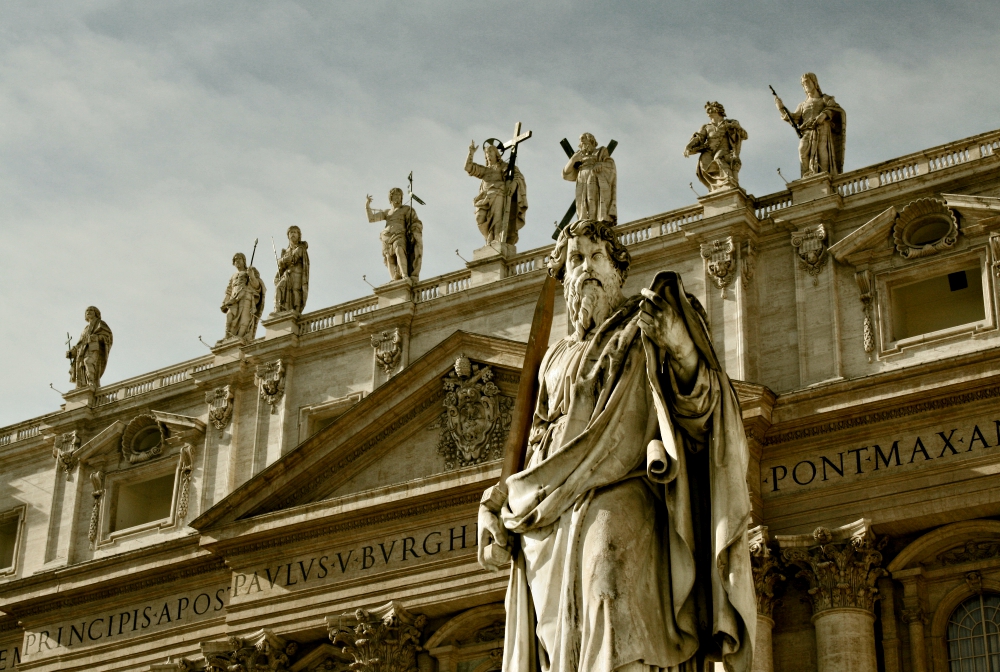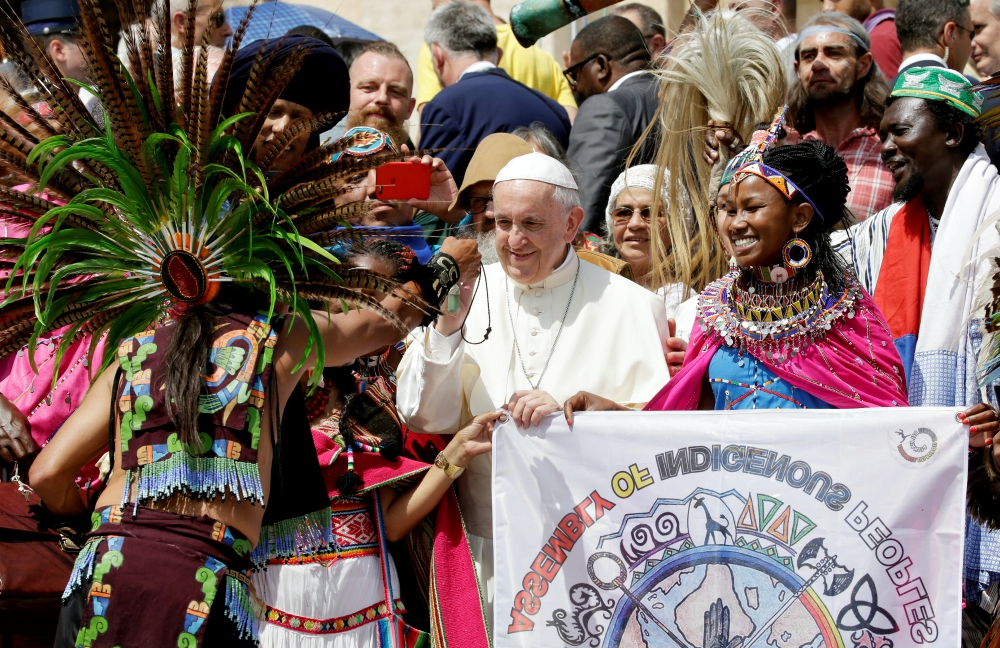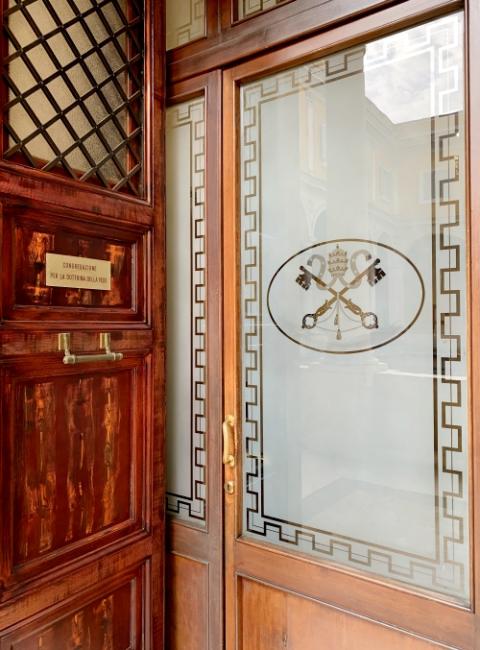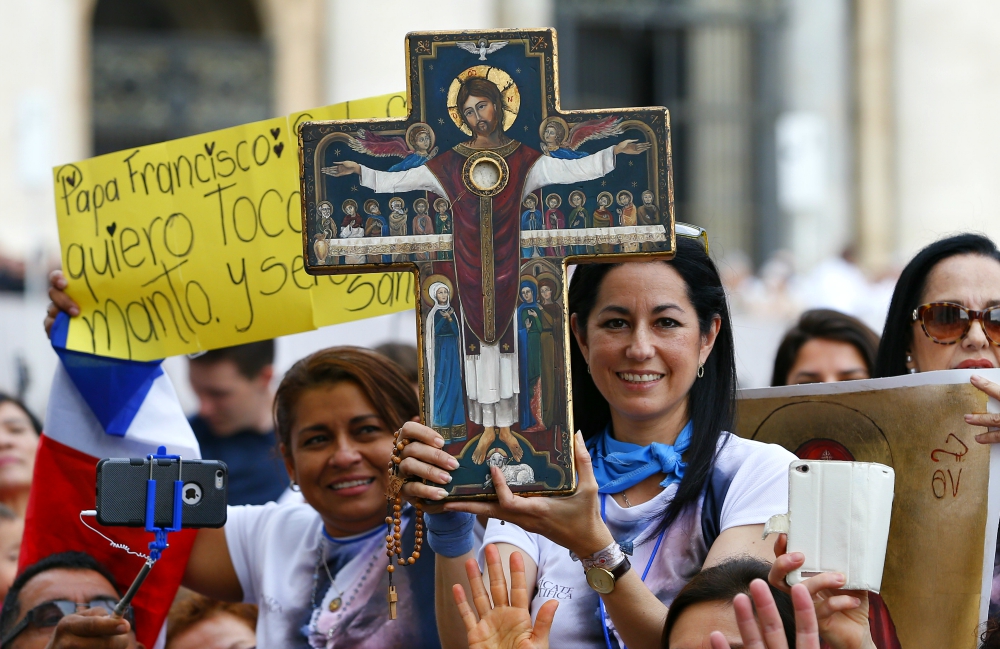
(Unsplash/Nils Huber)
Editor's note: Richard Gaillardetz, a noted ecclesiologist and former president of the Catholic Theological Society of America, reviewed the draft of Praedicate Evangelium obtained by NCR and offers this commentary on the text.
Pope Francis' long-awaited apostolic constitution on the reform of the Curia has finally appeared. Those looking for radical structural reform may be disappointed. However, the document contributes much toward a fundamentally different conception of the role and function of the Curia within the life of the church.
The Roman Curia in its modern form, dating back to the 16th century, has remained remarkably resistant to substantive reform, in spite of efforts undertaken by both Pope St. Paul VI and Pope St. John Paul II. Some of that resistance to reform may have been a consequence of the failure to consider the Curia within an ecclesiological framework sufficiently informed by the teaching of the Second Vatican Council (1962-65).
This document is far more successful in offering an alternative framework than it is in providing a comprehensive program of specific reforms consonant with that new framework.
Fundamental reimagination of Curia's role
The strength of this constitution lies less in specific institutional reforms than in the decisive rhetorical shift and consequent ecclesiological reimagination of the Curia's place in the life of the church.
In the prologue of the constitution, we already encounter what will be the overarching theme of the document, its reconception of the work of the Curia as an exercise not in domination and control but in Christian service inspired by Jesus' ministry of foot-washing.
In particular, the constitution stresses the Curia's ministry of service to the bishops. When Vatican II called for the reform of the Curia in Paragraph 9 of its 1965 decree Christus Dominus, it made a point of presenting the Curia as working "for the good of the churches and in service of the sacred pastors [the bishops]." Yet when the council's teaching was codified in the 1983 Code of Canon Law (Canon 360), the reference to serving the bishops was left out.
Pastor Bonus, the 1988 apostolic constitution in which John Paul II pursued curial reform and that has been the governing constitution for the Curia ever since, continued this omission in Article 1 of its general norms. However, the new draft constitution Praedicate Evangelium is quite explicit, at several points, in its insistence that the Curia serves not just the pope and the particular churches ("particular church" is the preferred canonical term for a diocese), but the bishops in particular.
In general, we can say that the document moves away from a longstanding conception of the Curia as the legal enforcement arm of the papacy and instead reimagines the role of the Curia around three central ecclesiological principles: collegiality, synodality and subsidiarity. Let's consider each in turn.
Collegiality
A consistent feature of the document is its reliance on the council's teaching on episcopal collegiality, that is, the council's teaching that the bishops share with the head of the episcopal college, the bishop of Rome, authority over the universal church. The previous two pontificates had made much of a distinction between affective and effective collegiality (with only a soft, "affective" collegiality attributed to the work of episcopal conferences and the episcopal synod). This distinction is much less prominent in this document.

Bishops attend a session of the Synod of Bishops on young people, the faith and vocational discernment at the Vatican Oct. 23, 2018. (CNS/Paul Haring)
The new constitution sees both episcopal conferences and the Synod of Bishops as valid instruments of collegiality and regularly appeals to their collaborative role in conjunction with the Curia. Indeed, various forms of the term "collaborate" appear 44 times in the document. By contrast, the term does not appear at all in Pastor Bonus.
Praedicate Evangelium grounds its treatment of collegiality within a theology of the universal church as a communio ecclesiarum, a communion of churches. Here the collegiality of the bishops manifests a more profound and comprehensive communion among the diverse particular churches.
This version of "communion ecclesiology" differs considerably from the version that appeared in official documents of the last two pontificates. In those earlier pontificates, with some exceptions (e.g., John Paul II's 1995 encyclical on ecumenism, Ut Unum Sint), the version of communion ecclesiology one encountered stressed hierarchical communion with Rome over legitimate diversity.
For example, the 1992 notification from the Congregation for the Doctrine of the Faith, Communionis Notio, had warned against misunderstandings of the expression communio ecclesiarum, which it feared might undermine the unity of the church.
In that document's version of communion ecclesiology, there was an emphasis on the ontological and chronological priority of the universal church over the local church. In this new constitution, we encounter an altogether different form of communion ecclesiology, a focus on "missionary communion" that offers much greater space for the diversity of the particular churches.
Synodality
Francis' development of the principle of synodality, a central leitmotif in his papacy, represents both an affirmation and a significant expansion of the Second Vatican Council's commitment to collegiality.
For Francis, the principle of synodality calls forth the ecclesial practice of attentive listening, a practice that must be operative at every level of church life. This serves as a second guiding principle in the constitution's reform of the Curia.
Praedicate Evangelium positions the Curia as an instrument for facilitating an effective listening to the witness of the particular churches. It acknowledges "a great treasury of experiential knowledge" that can be drawn from "a multitude of peoples, languages, and cultures in the world." The Curia is to function as "a platform and communication forum" for sharing this treasury of experiential knowledge with the particular churches.
Respect for the distinctive gifts that quite diverse particular churches offer the universal church is evident in the description of the new Dicastery for Evangelization. There, the work of evangelization is to be pursued with a special sensitivity to the dangers of colonialism. The Curia is to facilitate the study and "exchange of experiences" drawn from the witness of the particular churches.

Pope Francis receives a gift during a meeting with members of the Assembly of Indigenous Peoples after his general audience in St. Peter's Square at the Vatican May 30, 2018. (CNS/Reuters/Max Rossi)
In the treatment of the Dicastery for Education and Culture, we find a call to "protect indigenous cultures with their heritage of wisdom and their cosmic and spiritual balance as a richness for all of humanity." These cultural riches are under threat from "the influence of the dominant culture of globalization."
This synodal attentiveness to the gifts that emerge from local churches represents a vision of curial activity far removed from the top-down imposition of authority that has for so long been the Curia's modus operandi.
Subsidiarity
Praedicate Evangelium also recalls Francis' appeal in the magna carta of his papacy, the 2014 apostolic exhortation Evangelii Gaudium, for "a sound decentralization." It pursues this goal largely by way of an ecclesial application of the principle of subsidiarity.
This principle holds that, all things being equal, local issues and pastoral concerns ought to be addressed at the local level, with higher levels intervening only when the lower levels prove incapable of addressing an issue or because the unity of faith and communion requires it.
One can better appreciate the significance of Praedicate Evangelium's appeal to this principle by recalling that in the mid-1980s then-Cardinal Joseph Ratzinger led the charge against the application of subsidiarity to the life of the church.
Ratzinger viewed this ecclesial application of subsidiarity as an example of a problematic "sociological reductionism." Pope John Paul II shared this concern in his 2003 apostolic exhortation Pastores Gregis. Not surprisingly, the principle of subsidiarity is never invoked in John Paul II's constitution on the Curia, Pastor Bonus. Yet in Praedicate Evangelium, the principle of subsidiarity is invoked with respect to the work of the Curia 11 times!
New, reconfigured dicasteries
Although the specific structural reforms outlined in the document are not as dramatic as the overarching ecclesiological framework, there are some interesting features.
Praedicate Evangelium calls for those working in the Curia to have at least four years of experience in pastoral care, and the new constitution introduces a two-term limit for Vatican officials. When compared against Pastor Bonus, we also find in the new constitution a greater emphasis on lay participation in the work of the Curia.

The door to the Congregation for the Doctrine of the Faith is seen at the Vatican in February. (NCR photo/Joshua J. McElwee)
When we turn to the descriptions of the various dicasteries in the new constitution (there is no longer a distinction between "congregations" and "councils"), some interesting features are worthy of note. The new Dicastery for Evangelization is given a priority evident in its consideration before the Dicastery for the Doctrine of the Faith. Pastor Bonus, by contrast, had placed the Congregation for the Doctrine of the Faith first in its ranking of congregations. This reprioritization is entirely consistent with the ad extra missionary orientation of Francis' ecclesiology.
The ratio for the Dicastery for Evangelization suggests a broad understanding of evangelization. The dicastery is divided into two sections: one concerning "first evangelization" (embracing the work of the older Congregation for the Evangelization of Peoples) and a second section attending to reading "the signs of the times," a view of evangelization fully in keeping with Francis' call for a "culture of encounter."
Praedicate Evangelium offers some subtle but significant changes in its account of the work of the Dicastery for the Doctrine of the Faith. Where the earlier constitution charged the doctrinal congregation to "promote and safeguard the doctrine on faith and morals in the whole Catholic world," the new constitution situates this task within the broader work of supporting the pope and bishops in preaching the Gospel.
The constitution does address the dicastery's proper role in safeguarding doctrine, but it links this task with "the courage to seek new answers to new questions." Regarding situations when the dicastery is called upon to give "authorization for teaching in the Church," it is explicitly instructed to apply the principle of subsidiarity.
This may be a response to past instances when the Congregation for the Doctrine of the Faith had refused to grant a nihil obstat to certain professors requiring such ecclesiastical authorization.
The new constitution acknowledges the dicastery's responsibility to consider potentially problematic "writings" and "opinions," but in that context it explicitly calls for "dialogue" with those whose work is under consideration.
In contrast, Pastor Bonus required only that theologians be given an opportunity to defend themselves, a phrasing suggestive of an interrogation or investigation more than a dialogue.
The new constitution continues this dicastery's oversight over the doctrinal dimensions of the work of other dicasteries, but where Pastor Bonus simply affirmed that the documents of other dicasteries were subject to the doctrinal congregation's judgment, Praedicate Evangelium insists that where there is a disagreement or dispute between dicasteries, "the decision on the matter is to be reached through exchange and agreement."
Another noteworthy shift is evident in the constitution's consideration of the Dicastery for Divine Worship and the Discipline of the Sacraments. Here we see changes made in the light of Francis' earlier 2017 document on the translation of the liturgical texts, Magnum Principium, released motu proprio (on his own initiative).
Advertisement
Recall that the 2017 document had largely abrogated a previous 2001 text, Liturgiam Authenticam, which had insisted on a more literal translation of Latin liturgical texts and demanded that these translations be subject to the conferral of a recognitio by the Vatican, a process requiring a detailed line-by-line translation review.
The new constitution presumes Francis' Magnum Principium and asserts that, henceforward, this dicastery will offer only a more basic confirmatio of liturgical translations submitted to it, without the detailed line-by-line review.
It also reaffirms Francis' insistence that liturgical translations "be suitably adapted to local cultures." The dicastery is instructed to take "advantage of the collaboration and the periodic help of national liturgical commissions, with Bishops delegated for liturgical questions by the different Episcopal Conferences, and with representatives of Centres of study and reflection."
Regarding the Dicastery for Bishops, the new constitution goes beyond Pastor Bonus in its explicit call for "collaboration with the Bishops and Episcopal Conferences" and invites the involvement of the "people of God" in dioceses where a bishop is to be appointed. It is also charged with developing programs for the formation of new bishops.
The new constitution's exposition on the Dicastery for the Laity, Family, and Life encourages mutual relations between laity and clergy and acknowledges the "diversity of charisms" among all the baptized.
A curious detail is found in Article 135 that mentions the task of evaluating proposals coming from episcopal conferences for the institution of new ministries and ecclesiastical offices. This may be a reference to Pope Paul VI's 1972 apostolic letter Ministeria Quaedam, which did away with minor orders, established the instituted ministries of lector and acolyte that were to now be open to the laity (unfortunately, only lay males), and encouraged episcopal conferences to request the establishment of new instituted ministries. This could offer an opening for a greater expansion of lay ecclesial ministries in the church.

A woman holds an icon of Jesus as Pope Francis leads his general audience in St. Peter's Square at the Vatican Sept. 19, 2018. (CNS/Paul Haring)
Praedicate Evangelium's consideration of the Dicastery for the Laity, Family, and Life affirms the role of women and calls for the dicastery to promote women's participation in the life of the church while "formulating models of leadership roles for women in the church." Unfortunately, we also see here a further reference to "the feminine genius," a deeply problematic concept that Francis has employed all too frequently.
Finally, the constitution gives to the Pontifical Commission for the Protection of Minors more independent standing.
In conclusion, this new document goes a long way toward a theological reimagination of the role and function of the Roman Curia. It insists that the work of the Curia be conducted as a humble service to the pope, the particular churches and especially the bishops. It reimagines the service the Curia is to offer according to three central ecclesiological principles: collegiality, synodality and subsidiarity.
At a more practical level, the constitution engages in a modest pruning and reorientation of curial structures with a view toward better inter-dicasterial communication, collaboration and efficiency.
Unfortunately, the constitution does not provide specific provisions and possibilities for greater lay involvement and particularly laywomen's involvement in the mission of the Curia. It affirms the value of the people of God's participation in the appointment of a bishop, but fails to recognize that this is not just an ideal but an ecclesial right consistently recognized by the early church, and it fails to provide concrete procedures for ensuring the input of the local church in episcopal appointments.
It remains to be seen whether the new ecclesiological framework for considering the work of the Curia, absent more comprehensive and specific reforms, can effect substantive change in the conduct of the Curia in the life of the church.
[Richard R. Gaillardetz is the Joseph Professor of Catholic Systematic Theology at Boston College. He is the author of An Unfinished Council: Vatican II, Pope Francis, and the Renewal of Catholicism (Liturgical Press, 2016).]







